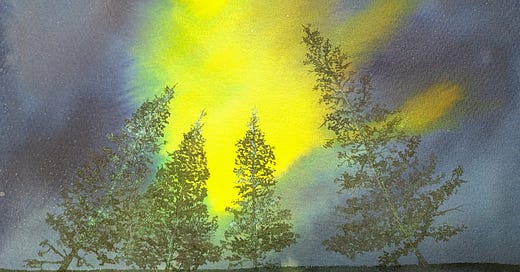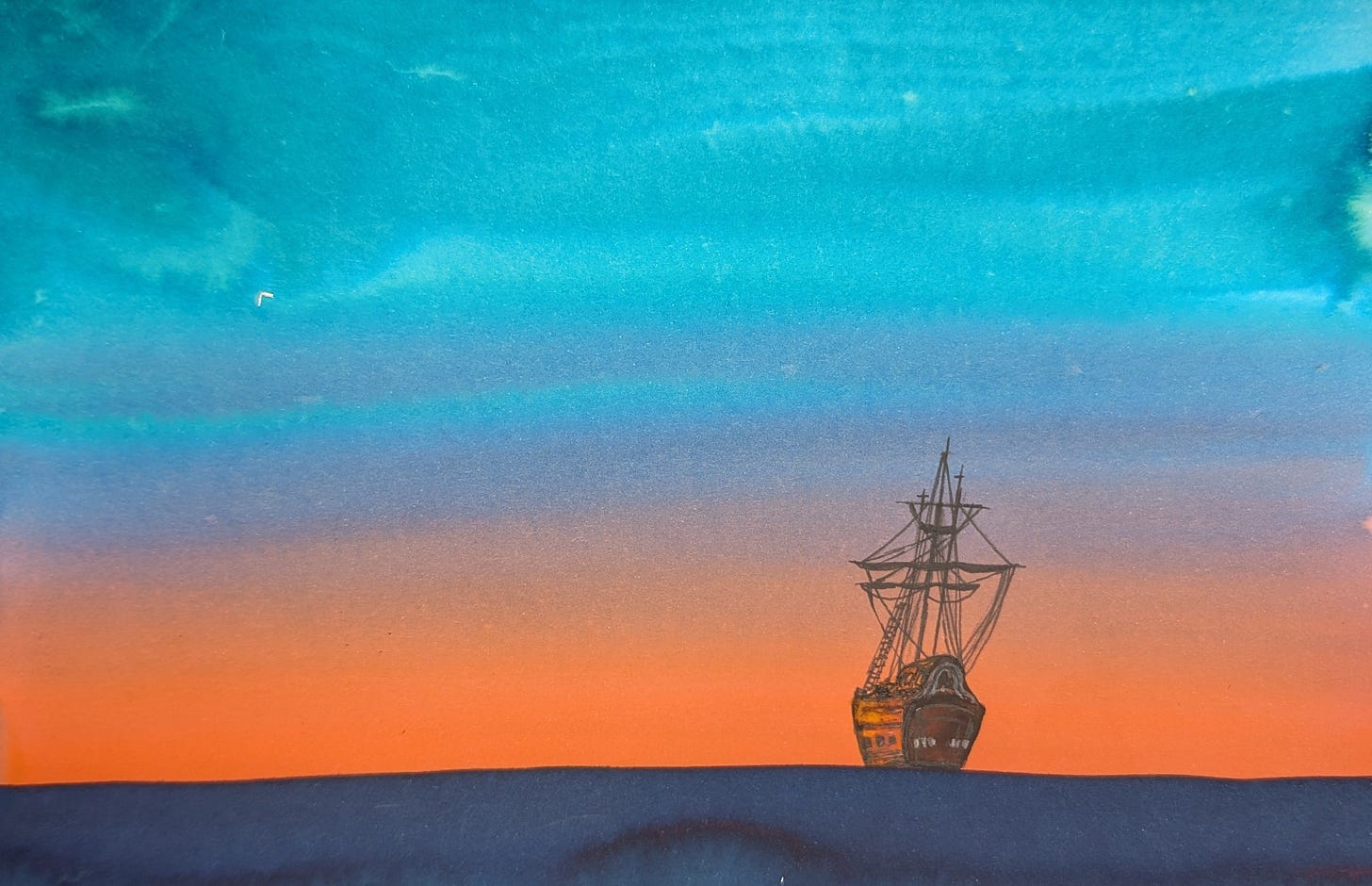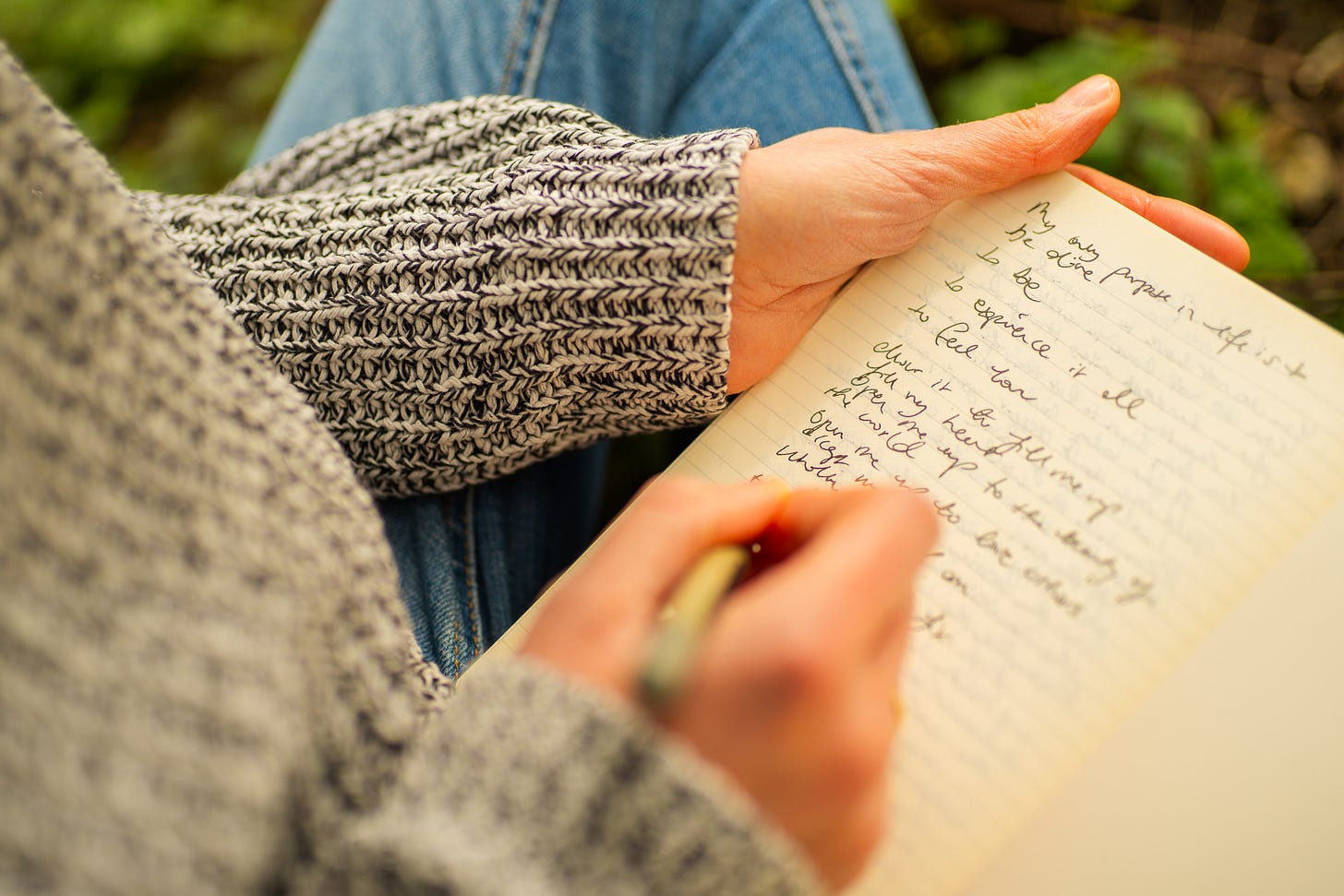Listen to me reading this post:
Just a reminder that I’m holding a free online workshop about joyful sober socialising. It takes place Tuesday 20 May at 12pm, and will also feature Jeni from The Sober Living Guide. Register your free place here.
Giving up my greatest love
Back in 2018, I made one of the hardest decisions of my life. I decided that I was willing to give up writing forever so that I could get sober.
Writing: my greatest passion, fused with identity, something I’d done since I was a little girl.
Writing: tangled up in my self-worth, career goals, my route to understanding myself and to other people (I hoped) understanding me.
Writing: something I seemed unable to do without drinking.
Despite writing stories prolifically as a child and young teenager, long before I discovered alcohol, I had come to believe that drinking was essential for me to write. I thought it loosened me up, quelled my fears and helped me access the mystical realm of creativity.
Giving that up felt too big. Too terrible. Until I had to. Until getting sober became more important to me than writing. More important than anything.
I sat with myself and asked myself the question: Ellie, are you prepared to give up writing to get sober? Is this important enough to you?
And my answer was yes. It felt like closing my eyes and letting go of my grip. It felt like grief. It felt like a relief. Acceptance. Hope. Sobriety was possible for me. That’s what mattered. Even if I had to give up on one of my dreams.
I smile at this now. How funny that I truly believed this. That I thought the door to my creativity could only be opened by imbibing a carcinogenic, misery-creating drug.
But all the great writers drank…
I would often justify my drinking to myself by telling myself it was fine, because so many great writers were addicted to alcohol. There was daily-drinker Ernest Hemingway, whose stripped-back writing was an inspiration to me (though even he conceded that he had to edit his work sober). Jean Rhys writing her lyrical novel Voyage in the Dark on two bottles of wine a day. Stephen King who wrote Misery and The Shining about the horrors of his own alcohol addiction, and who barely remembers writing Cujo because of how much he was drinking.
Even if alcohol did help writers like Edgar Allen Poe, Dylan Thomas, Jack Kerouac and F Scott Fitzgerald to create great work, it also plunged them into mental illness and despair and killed them all before they reached their 50th birthday. That’s a high price to pay for creating art.
Are we doomed alcoholics or deeply sensitive beings?
My theory is that the reason so many great writers and artists used alcohol was not because the alcohol unlocked their creativity, but because writers and artists are sensitive souls.
Perhaps they had all grown up feeling deeply in-tune with the world and with unique ways of seeing it that was different from expected norms. Perhaps they felt emotions strongly, in a way that could sometimes be overwhelming.
And perhaps, instead of being supported to be with their feelings and loved for their sensitivity, they were shamed for it. Perhaps their emotions were met with disgust and punishment by the adults in their life. And perhaps, try as they might, they couldn’t suppress their feelings, and so developed a deep shame for who they were.
And perhaps, one day, they picked up a bottle of booze and drank it down. And as their brains and bodies were sedated, they felt relief. The relief of their savage inner critic quietening down. The relief of the tension in their bodies slowly melting away. The relief of that terrible shame gripping their hearts softening. The edges of the world blurring. And perhaps they thought: yes, now I can write.
Alcohol is only needed when we’ve learned to hate who we are. How can a human endure such shame? Alcohol helps ease that shame. Until it doesn’t. Until it takes over our lives. Until it more important than anything else. Until it kills us.
‘If you see tremendous beauty or tremendous pain where other people see little or nothing at all, you’re confronted with big feelings all the time. These emotions can be confusing and overwhelming. When those around you don’t see what you see and feel what you feel, this can lead to a sense of isolation and general feeling of not belonging, of otherness.’
Rick Rubin, The Creative Act
I need you more than dope
At some point in 2019 I remember sitting on my bed in our light-filled flat in Putney, watching a video of Lady Gaga singing ‘Dope’. And tears rolled down my face.
Before she sings she talks about her own addictions to drugs and alcohol, and how she has lost friends to these two things. She says her own mantra out loud: ‘I do not have to be high to be creative. I do not have to be drunk to have a good idea. I can sit with my thoughts and not feel crazy. I can do it; I can do it without the dope.’
In the chorus she sings: ‘I’ll keep searching for an answer ‘cos I need you more than dope.’
In her words I heard her singing to her loved ones, and also to herself. I cried because I was connecting to the grief of how I had abandoned myself for so long.
And in that journey to quit alcohol, I was reaching out to myself, seeing myself again, making a promise to myself, my sweet young girl who loved writing and play so much: ‘My love, my dearest love, I need you more than alcohol.’
Does alcohol unlock the door to creativity?
I realise what alcohol was really doing was suppressing my fear. Suppressing my self-doubt. Quietening my inner critic who said: you’re shit, you’re no good, you’re going to write a load of rubbish! You’ll never be a published writer!
It quietened the voice saying it was indulgent, foolish and deluded to think I could write in any way but as a little hobby.
It took away the fear of the blank page; of the belief that it had to be brilliant straight away or I may as well give up.
It quietened the jealousy I felt reading about yet another 25-year-old writer publishing their debut novel to critical acclaim.
But what we think is confidence, or creativity, or the release of worries, is actually the experience of being sedated. Of our brain being damaged.
I used to see alcohol as a way to blur the edges of a life I found too sharp, too painful. I saw it as a way to temporarily step sideways into a different world where I gave less of a shit about anything.
And maybe that sounds good, and useful sometimes. To have a quick, temporary route to suppressing fears so that you can actually bloody write something without your inner critic inducing total paralysis.
But remember that: it’s temporary. Brief. The next day you wake up with worse anxiety than before (because of how much alcohol disrupts our bodies and brain chemistry) and, let’s be honest, it’s likely that a lot of the stuff you wrote isn’t actually much good. It doesn’t make a lot of sense.
And what is really happening here? We’re putting our creativity into the hands of a drug. We’re giving our power away. We’re telling ourselves: I can’t write, play or create art unless I am consuming a drug. I can’t do it on my own. I don’t have that power.
Here’s what happened to my writing when I quit alcohol…
I wrote. Loads. Loads more than I ever did when I was drinking. It was astonishing to me. The writing was… good. Better! I could edit it!
I applied to do an MA in Creative and Life Writing at Goldsmiths University of London - something I’d wanted to do for 10 years. I got a place.
I wrote dozens of pieces, including a big chunk of a memoir. I experimented, I learned, I was inspired. I received incredible advice and encouragement from my tutors and fellow students. I played.
I graduated with a distinction and was shortlisted for the Pat Kavanagh Prize.
So…. back in 2018 when I thought I was quitting writing in order to quit alcohol: I wasn’t. I was quitting alcohol in order to become an even better writer and to do things and discover things I’d only dreamed of.
So how do we really access creativity?
1. Pay attention
Alcohol blunts our ability to notice and pay attention. And paying attention is the key to creativity. Rick Rubin (who I just discovered produced Lady Gaga’s ‘Dope’) writes, in The Creative Act:
‘To live as an artist is a way of being in the world. A way of perceiving. A practice of paying attention. Refining our sensitivity to tune in to the more subtle notes. Looking for what draws us and what pushes us away. Noticing what feeling tones arise and where they lead.’
2. Lower the stakes
‘We tend to think that what we’re making is the most important thing in our lives and that it’s going to define us for eternity. Consider moving forward with the more accurate point of view that it’s a small work, a beginning.’
…‘All art is a work in progress. It’s helpful to see the piece we’re working on as an experiment. One in which we can’t predict the outcome. Whatever the result, we will receive useful information that will benefit the next experiment.’
Rick Rubin, The Creative Act
3. Write a load of rubbish
A practice: you’re sitting in front of your laptop, staring at blank page. You’re gripped with fear. Your inner critic is hissing at you: This better be brilliant! You better spend the next hour writing something that is immediately brilliant otherwise you’ve wasted your time and you’re a total failure.
Your response: It’s not going to be brilliant. I’m going to write a load of rubbish. I’m going to sit here and write a load of total rubbish!
And then merrily start typing away a load of rubbish. Notice how you feel. See what happens. (Spoiler: it won’t actually be all rubbish).
4. Creative work can be hard work
No one writes an amazing first draft. Writing requires editing. So. Much. Editing! The most important thing I learned on my MA was that creating great literary works is not really a romantic process of being struck my magic; it actually requires a lot of experimenting, discovery, things not working, perseverance, commitment, reviewing, learning, looking at your work with a compassionately critical eye (e.g. is that really what I meant to say? is that the best word to convey the meaning?), letting go of your ego and… editing, editing, editing.
I found this hugely freeing. That creating art wasn’t who I was as a person, but something I did. And if it’s something you do it’s something you can learn and get better at, and accept it takes time and patience and a whole bunch of compassion.
, who created all the artwork for this piece, is also a sober creative. He shared with me:
‘The act of choosing to be sober gave me strength. I was emboldened and empowered to show my middle finger to the rest of the world, and from day one I never doubted that I was doing the right thing.
‘Once I got over those early wobbly stages, I began to tap into all the creative energies I had dulled for so long. Not only was I a writer all along, but I was a better writer while sober. Writing led to a fascination with fountain pens and different inks, which led to a fascination with art, watercolor, and other mediums.
‘Having been a musician in a former life, my new creative outlet was staring me in the face. Since I wasn’t spending my free time either getting drunk or recovering, I had time and energy to pursue other concepts and ideas. I was no longer mired in that inauthentic version of myself and was free to explore.’
Some other great posts about creativity and sobriety
- writes here that the way to experience transcendence, rather than using drugs and alcohol, is to 'go where you feel most alive.’
In her piece Why I Stopped Drinking
writes that sobriety means paying attention. She shares quotes from writers who agree that attention and noticing are essential to creating art.- writes here about writing and sobriety:
‘Drugs remove us from our visceral present, and water down the brutal honesty needed to make art. Not to mention, after the high wears off we are left with a sense of loss, a feeling that in order to touch the magic again we’ll need to return to the fuzzy place. This is unsustainable for lifelong work, longterm success, this is putting your art into the hands of a fleeting feeling. The artist has more agency than she knows.’
If you value what you read here, you can support my work by liking and sharing this post, and by becoming a free subscriber to A Little Fantastic.
You can also make a small contribution by clicking the button below. Your support means I can keep providing free posts and workshops to help people on the path to recovery. However you choose to support me today, I’m so grateful to you.
How did quitting alcohol affect your creativity?
If you drink, are you afraid that it will affect your creativity?
Please do share in the comments below; I love hearing from you.










Thank you for exploring this! I got an MFA in creative writing between 2010-2013 and I thought hard drinking was part of the package.
It’s funny you mention Hemingway (who killed himself) and Kerouac and Fitzgerald- I had such a romanticized idea of those men, who drank themselves to death.
And as you say, the true key for so much of my writing was to get honest and clear-eyed, and that meant putting down the bottle. And then the floodgates opened.
So many writers I deeply admire are actually in recovery.
Great read, thank you 🙏
What a banger of a read, and thanks so much for the hat tip! Wonderful that you included your own experience and process throughout ... also got me thinking about how many sensitive creative souls we haven't heard from because it's hard to speak clearly from inside a bottle, even if it is quieter and less scary in there.